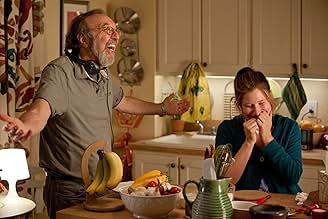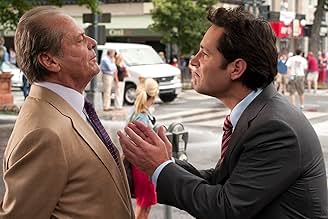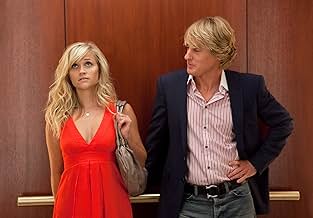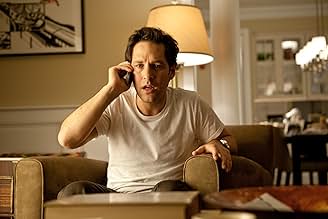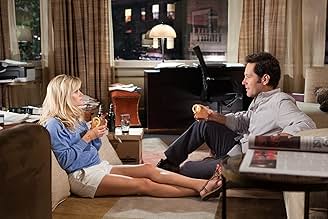VALUTAZIONE IMDb
5,4/10
56.332
LA TUA VALUTAZIONE
Dopo essere stata tagliata fuori dalla squadra di softball statunitense, Lisa si ritrova a valutare la sua vita e nel bel mezzo di un triangolo amoroso, nel momento in cui un ragazzo in cris... Leggi tuttoDopo essere stata tagliata fuori dalla squadra di softball statunitense, Lisa si ritrova a valutare la sua vita e nel bel mezzo di un triangolo amoroso, nel momento in cui un ragazzo in crisi compete con il suo attuale fidanzato.Dopo essere stata tagliata fuori dalla squadra di softball statunitense, Lisa si ritrova a valutare la sua vita e nel bel mezzo di un triangolo amoroso, nel momento in cui un ragazzo in crisi compete con il suo attuale fidanzato.
- Regia
- Sceneggiatura
- Star
- Premi
- 3 candidature totali
Recensioni in evidenza
This film has an all-star cast... and not much else. The story meanders around and never really goes anywhere interesting. This was particularly disappointing coming from the writer/director behind As Good as It Gets, one of the best romantic comedies of the past few decades. This film cost a shocking $120 million and made very little at the box office, hence becoming one of the biggest bombs of all time. I only checked it out because it was getting popular on Netflix, I somewhat regret my decision. Just as Jack Nicholson likely regrets having this, as of 2020, be his final film.
I was expecting to be very disappointed with this film because I'd heard that most people disliked it. I really really liked it. I think that audiences these days have to have a joke every 30 seconds to be entertained. Maybe audiences feel short changed if there isn't a huge obvious wrap up off the plot at the end of the film. I liked that everything wasn't black and white in the film. There are many unanswered questions. The characters' intentions and feelings weren't absolutely clear. That's what I loved about it.
It's sad that so many people disliked this film, but I think it's very courageous of James l. Brooks to write a film that pleased him and not have to pace it like most other "successful" Hollywood crap movies. This film makes you think unlike many other huge hit comedies these days.
It's sad that so many people disliked this film, but I think it's very courageous of James l. Brooks to write a film that pleased him and not have to pace it like most other "successful" Hollywood crap movies. This film makes you think unlike many other huge hit comedies these days.
Some filmmakers you just fall into. The ones I hold most dear are those that are both expert cinematic storytellers and attempt to reshape me. These are rare, but there is a second tier of cinematic storytellers; although they do not work at deep levels, you just get captured by the mastery of the storytelling. Brooks is one of these. He is a master and even his disaster in 1994 was interesting.
This film did poorly in the US. I think it was not zany enough, short enough or abstracted from reality enough for the audience who is attracted to the form. Perhaps if it is judged as mere candy, it fails. But I found it well met the requirements on which the genre was founded: the alternating of charm in the nature of humans with humor about many of the same traits. This engagement-detachment by humor is perhaps the oldest storytelling device after the technique of omission, and Brooks is delicate if old-fashioned.
The story is that he is valued in the business for adding texture of these two qualities: humor and endearment. But he gets stuck in creating scenes that are no longer than a few minutes, because that is what the market pulls. He gets paid extremely well for guiding "The Simpsons," basically two jokes per show, and also as uncredited script doctor on a scene by scene basis. He hates this, he has said and when he can find the space for a long form project, he does it as if his soul is in the balance.
He doesn't start with characters weaving a story, or even a story proper. He is all about situations and how people react within them as they try to gain control. Our two main characters here, destined for love, are struggling less with the lives they are given than the techniques they had been using until that point to cope. The weapons in forming the new situations we desire then to get, are words. And such words in dialog that is so perfect we don't deserve the simply by paying 8 bucks.
Brooks is a writer, but it is clear that every line is written within a specific cinematic vision. Some of the shots here are quite unconventional, the composition and rhythm of shots is very personal and the flow of the words absolutely matches or is counterpointed to that rhythm. Watch the motions of the camera and the dialog when Lisa is first in George's apartment. This is effective and idiosyncratic to Brooks. It worked for me because these films are all about deferred gratification and he is serious about pushing it.
In little things, it works. Witherspoon's lack of sex appeal is handled by making her a tough jock. The formula demands — absolutely demands — that the guy profess his love at the end in front of an audience representing us. We know he is going to her birthday party to do just this, but he does not. Instead Brooks has placed a clever scene before this, a radically unconventional one that works when paired with what happens after the party, observed by no one but us and Nicholsen's character. In this scene — possibly the first written — has the two to-be lovers filming an awkward proposal, and then engaging in a re-enactment in a folded engagement. It satisfies the formula without following it.
There are several folds along these lines, highly structured and effective.
Ted's Evaluation -- 3 of 3: Worth watching.
This film did poorly in the US. I think it was not zany enough, short enough or abstracted from reality enough for the audience who is attracted to the form. Perhaps if it is judged as mere candy, it fails. But I found it well met the requirements on which the genre was founded: the alternating of charm in the nature of humans with humor about many of the same traits. This engagement-detachment by humor is perhaps the oldest storytelling device after the technique of omission, and Brooks is delicate if old-fashioned.
The story is that he is valued in the business for adding texture of these two qualities: humor and endearment. But he gets stuck in creating scenes that are no longer than a few minutes, because that is what the market pulls. He gets paid extremely well for guiding "The Simpsons," basically two jokes per show, and also as uncredited script doctor on a scene by scene basis. He hates this, he has said and when he can find the space for a long form project, he does it as if his soul is in the balance.
He doesn't start with characters weaving a story, or even a story proper. He is all about situations and how people react within them as they try to gain control. Our two main characters here, destined for love, are struggling less with the lives they are given than the techniques they had been using until that point to cope. The weapons in forming the new situations we desire then to get, are words. And such words in dialog that is so perfect we don't deserve the simply by paying 8 bucks.
Brooks is a writer, but it is clear that every line is written within a specific cinematic vision. Some of the shots here are quite unconventional, the composition and rhythm of shots is very personal and the flow of the words absolutely matches or is counterpointed to that rhythm. Watch the motions of the camera and the dialog when Lisa is first in George's apartment. This is effective and idiosyncratic to Brooks. It worked for me because these films are all about deferred gratification and he is serious about pushing it.
In little things, it works. Witherspoon's lack of sex appeal is handled by making her a tough jock. The formula demands — absolutely demands — that the guy profess his love at the end in front of an audience representing us. We know he is going to her birthday party to do just this, but he does not. Instead Brooks has placed a clever scene before this, a radically unconventional one that works when paired with what happens after the party, observed by no one but us and Nicholsen's character. In this scene — possibly the first written — has the two to-be lovers filming an awkward proposal, and then engaging in a re-enactment in a folded engagement. It satisfies the formula without following it.
There are several folds along these lines, highly structured and effective.
Ted's Evaluation -- 3 of 3: Worth watching.
Okay, so call me crazy, but I would NEVER give a movie a one star rating unless it was absolutely miserable. Like if I would rather leave the theater and the $10 I spent on it than watch it. How Do You Know was not a one star movie. The only problems I saw with it were that it was a little long. I thought they could have cut some scenes out and not only gotten away with it, but made it a more enjoyable experience. Also, with actors like Paul Rudd and Owen Wilson (plus how it was advertised as a comedy) I was expecting to do a lot more laughing in the movie than I really did. Don't get me wrong, it was funny, but not as much as you'd expect. I think if you go to this movie knowing it's more of a romantic comedy than a typical Owen Wilson/Paul Rudd style comedy then you'll be pleasantly surprised. I really enjoyed the movie, I thought it was very clever and surprisingly uplifting and I thought it was definitely worth the money.
It was winter and i was alone home. I was anticipating there will be no wifi for a couple of days so i had some movies downloaded on my Netflix. Seeing Owen wilson and Paul Rudd on the cast, i thought this movie would be Rom Com. But as i start watching, i found out it's a Romantic Drama with lots of life lessons. I am lucky there was no Internet connection on that afternoon. It's a movie i am gonna suggest to everyone who is having a bad day. I am gonna watch it again.
Lo sapevi?
- QuizOne of the lesser known "big box-office bombs of all time"; the budget spiraled up to $120 million due to high salary demands of its principal cast and director (around $50 million), a lengthy production, as well as a costly re-shoot for the beginning and the ending. Coupled with marketing costs, the movie lost an estimated $105 million.
- BlooperAfter their first night together, Lisa is seen wearing a red camisole that has straps showing after putting on her red dress from the night before. The straps didn't show during their date and after she got home.
- ConnessioniFeatured in The Tonight Show with Jay Leno: Episodio #19.58 (2010)
- Colonne sonoreWhat Is It This Time?
Written by Jamie Lidell (as Jamie Lidderdale) and Mocky (as Dominic Salole)
Performed by Jamie Lidell
Courtesy of Warp Records
By Arrangement with Zync Music
I più visti
Accedi per valutare e creare un elenco di titoli salvati per ottenere consigli personalizzati
- How long is How Do You Know?Powered by Alexa
Dettagli
- Data di uscita
- Paese di origine
- Sito ufficiale
- Lingua
- Celebre anche come
- ¿Cómo saber si es amor?
- Luoghi delle riprese
- Aziende produttrici
- Vedi altri crediti dell’azienda su IMDbPro
Botteghino
- Budget
- 120.000.000 USD (previsto)
- Lordo Stati Uniti e Canada
- 30.212.620 USD
- Fine settimana di apertura Stati Uniti e Canada
- 7.484.696 USD
- 19 dic 2010
- Lordo in tutto il mondo
- 48.668.907 USD
- Tempo di esecuzione2 ore 1 minuto
- Colore
- Mix di suoni
- Proporzioni
- 1.85 : 1
Contribuisci a questa pagina
Suggerisci una modifica o aggiungi i contenuti mancanti








